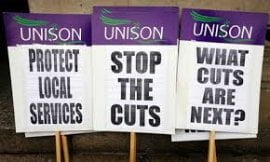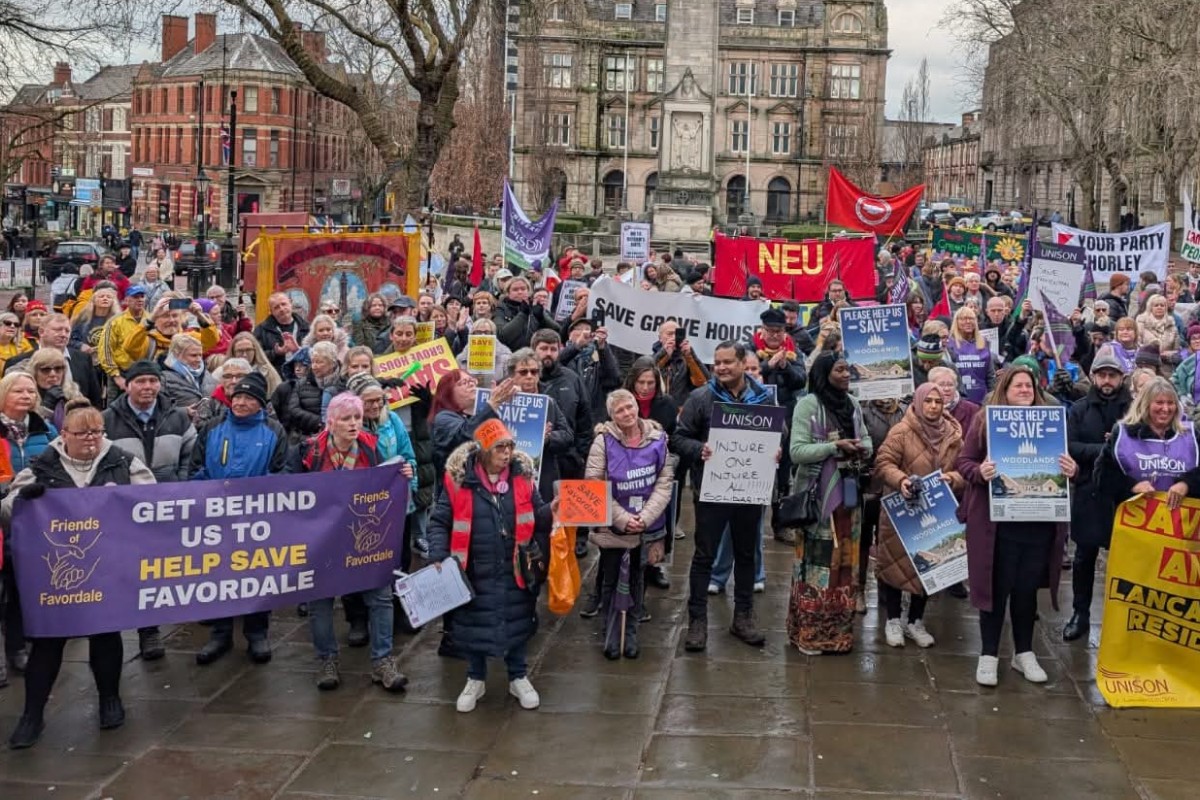UNISON’s Local Government Conference, held in Liverpool on June 16-17th, brought together delegates from hundreds of branches in England, Cymru Wales and the North of Ireland for two days of discussion and debate. Conference discussed some of the most pressing issues facing members: Eric Pickles’ attacks on facility time; the threat of privatisation; recent attacks on Teaching Assistants from the so called “Reform” think tank; and the pressures on domiciliary care. UNISON Socialist Appeal supporters report on this year’s conference.
UNISON’s Local Government Conference, held in Liverpool on June 16-17th, brought together delegates from hundreds of branches in England, Cymru Wales and the North of Ireland for two days of discussion and debate. Conference discussed some of the most pressing issues facing members: Eric Pickles’ attacks on facility time; the threat of privatisation; recent attacks on Teaching Assistants from the so called “Reform” think tank; and the pressures on domiciliary care.
Whilst the majority of motions were passed overwhelmingly by conference, it would be a mistake to assume that this was simply a result of them being non-contentious. The last few years have been very difficult for local government workers. We’ve been in the front line as far as the austerity is concerned, with a cut of over 28% in budgets since the Con-Dem government was cobbled together in 2010.
Lenin made the point that life teaches and the mood at conference has changed over the years: 380,000 local government workers have been made redundant over the past three years and services have been cut to the bone; there is a general agreement on many issues. What is missing, however, is a clear sighted and consistent leadership.
At a time when branches are fighting on all fronts, and more very deep cuts are anticipated, courtesy of the despised Eric Pickles, a clear strategy and a sense of where the leadership are going is vital.
Last year Dave Prentis made a big show of smashing an ice sculpture of a £ sign as a symbol of the leadership’s intention to smash the pay freeze in the Public Sector. Members in local government have lost around 16% of their pay in real terms since the last General Election and there is a need to seriously address the question of low pay. Many care workers now earn less than the minimum wage as they are not paid for travel between jobs for example.
Although delegations are relatively small with branches having maybe half a dozen delegates, Conference can reflect the mood of members. This was most clearly reflected in the discussion around “Motion C” on pay. Whilst the motion dealt with next year’s pay campaign, the debate centred around the decision of the Service Group Executive (SGE) to run a consultative ballot on the employers 1% final pay offer, without making a recommendation to accept or reject.
The SGE decided by 14 votes to 13 not to make a recommendation, and the question put to members was couched in terms designed to ensure acceptance of the offer. Over the last few years it has been difficult to argue for a campaign of industrial action over pay, as many people had other worries, particularly over instability and uncertainty about the future of their jobs. This was reflected last year in the statements by Ed Balls and Ed Miliband which appeared to support the pay freeze. However, against this background 41% of members voted to reject the pay offer in the consultative ballot.
One delegate after another came to the rostrum and criticised the SGE; particularly delegates from the North West and London. These two regions had made a recommendation to reject the offer and had turned out majorities in the ballot to reject. Speakers supporting the SGE’s line received muted responses from the delegates while those making criticisms were applauded and cheered. It is evident that this debate reflected a change in the mood around the country from previous years. The motion itself would no doubt have been non-controversial if the SGE had given a lead this year and had taken a stance on the pay offer, which everyone seemed to accept was an insulting figure. However, they fudged the issue and this was the result.
Motion 47 from Lambeth asked Conference to request that the UNISON Labour Link should seek to work with the newly established group of “Councillors Against the Cuts”. The group, which pledges to vote against all the cuts, includes the three Hull Councillors and around 25 councillors in total. See the Councillors Against the Cuts statement here. The motion was overwhelmingly passed after an amendment designed to muddy the waters was soundly defeated.
For those with long memories it was significant that this particular Motion 47 was passed in Liverpool and moved by Lambeth – the two areas that fought the Tories in the 1980’s on the basis of no cuts and no rate rises. 47 Labour Councillors were barred from office and surcharged after the Labour Leaders (and particularly Neil Kinnock) refused to back their struggle. A lot of the legacy of that struggle has unfortunately been squandered in Liverpool, but the evidence from this conference is that the tide may be beginning to turn within local government.
An example of this change is the decision of UNISON members in Scotland to reject the pay offer and ballot for strike action. Ultimately there is no alternative but to fight to defend wages, terms and conditions and the services that we deliver.
UNISON Socialist Appeal Supporters held a successful public meeting, raising over £250, as well as selling dozens of papers, books, and pamphlets from our stall during the conference. Marxist ideas are increasingly chiming with people’s experience, a process which will only accelerate in the future.






